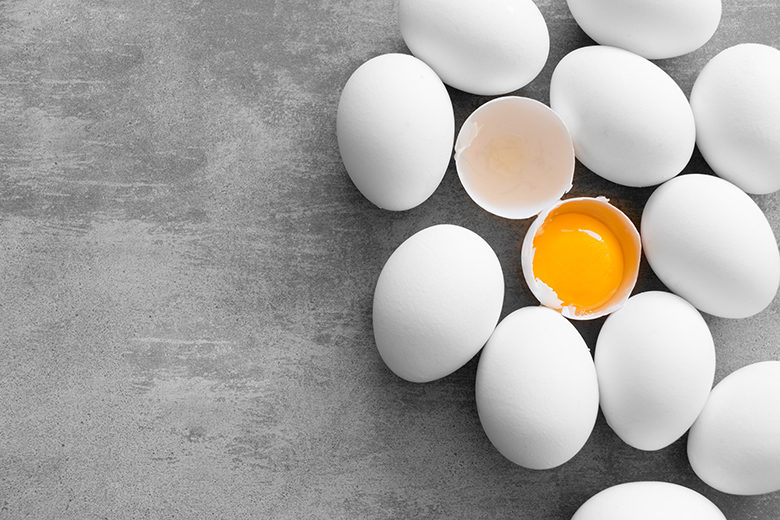
I feel bad for eggs. There’s so much about them to love, yet there’s so much fear around them. For years, people have limited their egg intake thinking it was the major cause of high cholesterol levels and increased risk of heart disease. In fact, I was one of those people who stigmatized eggs and limited my consumption to hard-boiled egg whites or an egg-white-only omelet. Granted, I was never a big fan of eggs, but when I did eat them I figured why get the added fat and cholesterol when all I really want from the egg is protein? And, I wasn’t the only one. Many people thought this way … and still do. But the science shows that we were wrong. I was wrong too, and have been a huge egg fan for the past three-and-a-half years.
One of the biggest nutrition myths is that eating eggs raises serum cholesterol levels. Another is that egg yolks are a waste of calories and don’t provide any nutritional benefit. Here’s the truth: Eggs are nutritional powerhouses. ![]()
Nutrition in an Egg
One large egg has 13 essential vitamins and minerals, six grams of protein and all nine essential amino acids in the appropriate ratio for humans (the building blocks of protein) — all for only 70 calories! Here are some of the stand-out nutrients found in eggs — especially the yolks — and what they can do for you:
- Choline: Plays an essential role in fetal and infant brain development. Adequate choline during pregnancy also may prevent neural tube defects.
- Lutein and Zeaxanthin: These phytochemicals play a role in eye health, particularly in the prevention of cataracts and macular degeneration.
- Vitamin D: Is essential for bone health by aiding the absorption of calcium. Vitamin D is known as the sunshine vitamin because the most natural way to get vitamin D is through your skin from the sun. There aren’t many foods that naturally contain vitamin D, but those little egg yolks do.
- Protein: Eggs are a good source of high-quality protein (one large egg has 6 grams), with 60 percent coming from the whites and 40 percent from the yolks. Protein is satiating, which helps with appetite and blood sugar control, both of which are important for weight maintenance and diabetes prevention.
- Leucine: An essential amino acid that plays a unique role in muscle protein synthesis.
Eggs and Cholesterol
Now, let’s talk a little about cholesterol. Believe it or not, cholesterol is essential to the body and plays a special role in the formation of brain cells and certain hormones. What you may not realize is that there is a difference between dietary cholesterol found in food, and cholesterol in the blood, most of which is made in the liver.
Consumption of dietary cholesterol, such as that in eggs, has little impact on your blood cholesterol levels, and research has shown this repeatedly. Data from a January 2015 American Heart Journal study indicated that daily consumption of eggs or egg substitute had no adverse effects on any cardiac risk factors. Even more so, the authors of this study said that excluding eggs could potentially lead to alternate choices high in starch and sugar, potentially associated with increased cardiovascular disease risk.
So where does that leave you and your eggs? The American Heart Association and the Dietary Guidelines for Americans (scheduled to be updated this year) recommend no more than 300 milligrams a day of dietary cholesterol. While they don’t specify a limit on eggs, one large egg has about 185 milligrams of cholesterol, leaving the recommendation for consumption at one egg per day. Keep in mind that if you’re not eating eggs daily, you could have more than one per day.
My personal preference is to use a combination of whole eggs and egg whites. Here’s an easy trick when it comes to cooking and baking with eggs: “1 whole egg = 2 egg whites.”
I’m still not a fan of the texture and consistency of hard-cooked egg yolks, but I do enjoy a soft cooked or poached egg with a runny yolk — and I don’t feel the least bit guilty enjoying them, especially with some good whole-wheat sourdough bread for dipping.






